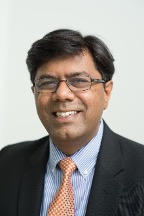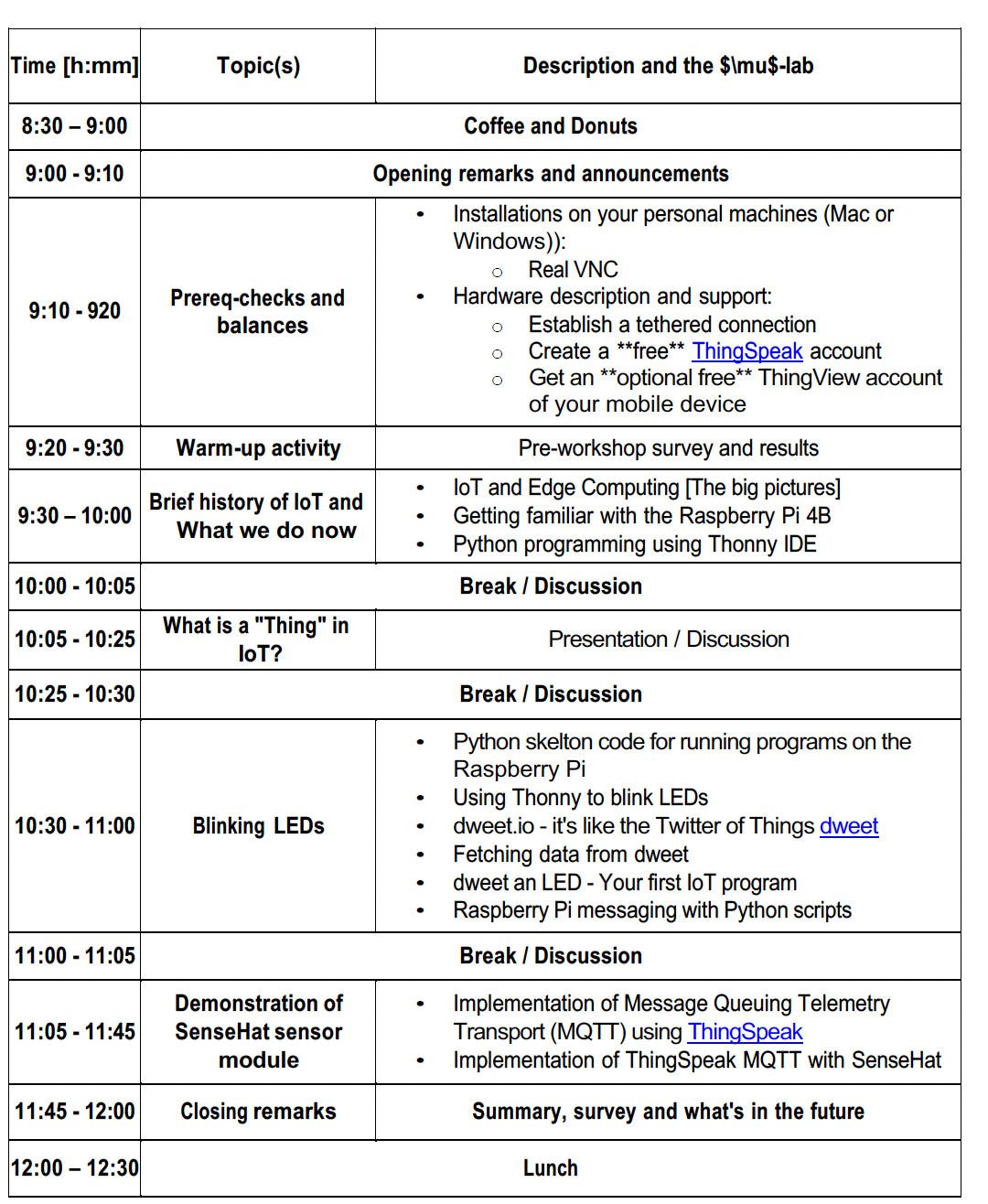Connect, Compute and Communicate! A Practical Introduction to a DIY Internet-of-Things System
*** You can earn THREE Professional Development Hours (PDHs) ***
The Internet of Things (IoT) is perceived as a collection of smart, connected devices with the ability to send and receive data; “internet” encapsulates connectivity and “things” are devices (electronic or mechanical) that can be adapted toward connectivity. There is an alternative perception of IoT, as a design methodology that facilitates interoperability and connectivity of physical systems. Edge computing is a strategy for localized analysis of data, ahead in the pipeline of powerful data center- or cloud-based post-processing.
This workshop provides an introductory-level exposure of the IoT framework and expands it with edge computing ideology via practical and hands-on exposure. The attendees will be exposed to the IoT framework using sensors, IoT automation and connectivity in a “microLab” environment that includes the Raspberry Pi (single-board computer) and Python programming language.
The attendees will be expected to bring their own laptops with the following requirements:
• Personal machines or laptops (only) with:
o Mac OS 12+ or Windows 10+ operating system
o One USB A or USB C port that is available for use during the workshop
o WiFi connectivity
o A free version of RealVNC® Viewer software downloaded and installed; instructions will be provided to the registrants.
o Chrome web browser downloaded and installed
The attendees will be expected to work in small groups using a limited number of hardware components and WiFi connectivity that will be provided. The workshop will facilitate learning about how IoT with edge computing capability is going to be the backbone of the industry4.0.
Learning objectives:
1. Gain basic, hands-on knowledge of Raspberry Pi hardware with Python programming language
2. Gain exposure to IoT automation platforms such as ThingSpeak
4. Implement one Raspberry Pi-based IoT system
5. Gain insight on edge computing strategies with the Raspberry Pi
Date and Time
Location
Hosts
Registration
-
 Add Event to Calendar
Add Event to Calendar
- 7415 Arlington Boulevard
- Falls Church, Virginia
- United States
- Building: Thomas Jefferson Library
- Room Number: Meeting Room 1
Speakers
Dr. Kartik Bulusu of George Washington University, Washington, DC
Connect, Compute and Communicate! A Practical introduction to a DIY Internet-of-Things system
The Internet of Things (IoT) is perceived as a collection of smart, connected devices with the ability to send and receive data; “internet” encapsulates connectivity and “things” are devices (electronic or mechanical) that can be adapted toward connectivity. There is an alternative perception of IoT, as a design methodology that facilitates interoperability and connectivity of physical systems. Edge computing is a strategy for localized analysis of data, ahead in the pipeline of powerful data center- or cloud-based post-processing.
This workshop provides an introductory-level exposure of the IoT framework and expands it with edge computing ideology via practical and hands-on exposure. The attendees will be exposed to the IoT framework using sensors, IoT automation and connectivity in a “microLab” environment that includes the Raspberry Pi (single-board computer) and Python programming language.
The attendees will be expected to bring their own laptops with the following requirements:
o Mac OS 12+ or Windows 10+ operating system
o One USB A or USB C port that is available for use during the workshop
o WiFi connectivity
o A free version of RealVNC® Viewer software downloaded and installed; instructions will be provided to the registrants.
o Chrome web browser downloaded and installed
The attendees will be expected to work in small groups using a limited number of hardware components and WiFi connectivity that will be provided. The workshop will facilitate learning about how IoT with edge computing capability is going to be the backbone of the industry4.0.
Learning objectives:
1. Gain basic, hands-on knowledge of Raspberry Pi hardware with Python programming language
2. Gain exposure to IoT automation platforms such as ThingSpeak
4. Implement one Raspberry Pi-based IoT system
5. Gain insight on edge computing strategies with the Raspberry Pi
Biography:
Dr. Kartik V. Bulusu is an Associate Research Professor in the Department of Mechanical and Aerospace Engineering at The George Washington University, Washington DC. He designed taught a cross- disciplinary course titled, Internet of Things (IoT) and Edge Computing with applications in cyber-physical systems and speech processing.
In addition, he developed courses for first year engineering students on the engineering applications of Raspberry Pi, Python programming and mobile App development inspired by social innovation potential during the COVID- 19 pandemic. His research interests span the areas of human health and sustainable energy with focus on mechanics of biological fluids, low-cost energy technologies and applications of wavelet transforms.
His current research work on biofluid dynamics of the cardiovasculature, rheology of biological fluids and applications of wavelet transforms has been supported by NSF and the Center forBiomimetics and Bioinspired Engineering (CBBE), GWU. He developed a wavelet transform-based computational code (PIVlet) for the analysis of complex vortical patterns encountered in arterial blood flow.
He has extensive knowledge of experimental fluid mechanics and non-invasive measurement techniques such as laser Doppler velocimetry (LDV), particle image velocimetry (PIV), schlieren imagery, magnetic resonance velocimetry (MRV) and molecular tagging velocimetry (MTV). Dr. Bulusu was recognized with the ASME Best Paper Award by the Advanced Energy Systems Division (AESD) Heat Pump Technical Committee and William and Louise Corcoron Award for contributing to the intellectual and social life of the School of Engineering and Applied Science, GWU.



